15 of the Best Back Moves for Building Muscle
- Kettlebell Swings
- Barbell Deadlift
- Barbell Bent-over Row
- Pull-up
- Dumbbell Single-arm Row
- Chest-supported Dumbbell Row
- Inverted Row
- Lat Pulldown
- Single-arm T-bar Rows
- Farmer's Walk
- Renegade Row
- Superman
- TRX Low Row
- Med Ball Wood Chop
- Good Mornings
1. Kettlebell Swings
Why: KB swings aren’t just for CrossFit zealots. Far from it. Working your back’s posterior chain, kettlebell swings are also devilishly effective for building a stronger core, which will help take weight away from your lower back. Start with a lighter weight, get used to form and progress slowly.
How: Place a kettlebell a couple of feet in front of you. Stand with your feet slightly wider than shoulder-width apart and bend your knees to lean forward and grab the handle with both hands. With your back flat, engage your lats to pull the weight between your legs (be careful with how deep you swing) then drive your hips forward and explosively pull the kettlebell up to shoulder height with your arms straight in front of you. Return to the start position and repeat without pauses.
2. Barbell Deadlift
Why: The true king of compound movements, the barbell deadlift is a full-body move — building stronger legs, back, shoulders and arms. Its place in your next back workout is well deserved — as you work through the full range of motion, your upper-back muscles (rhomboids, traps, rear delts and lats) are firing away helping to keep your torso straight, while preventing your back from rounding and causing injury.
How: Squat down and grasp a barbell with your hands roughly shoulder-width apart. Keep your chest up, pull your shoulders back and look straight ahead as you lift the bar. Focus on taking the weight back onto your heels and keep the bar as close as possible to your body at all times. Lift to thigh level, pause, then return under control to the start position.
Why: As you’re working with a barbell, you should be able to shift more weight during a barbell bent-over row. Helping your recruit more muscle — and, obviously, elicit further muscle growth — you’ll work your middle and lower traps, rhomboid major, rhomboid minor, upper traps, rear deltoids, and rotator cuff muscles. Keep your shoulder blades back to avoid slouching, which puts undue stress on your lower back.
How: Grab a barbell with an overhand grip, hands slightly wider than shoulder width apart. With your legs slightly bent, keep your back perfectly straight and bend your upper body forward until it’s almost perpendicular to the floor. From here row the weight upwards into the lower part of your chest. Pause. And return under control to the start position.
4. Pull-Up
Why: If you want a V-shape physique — you do, that’s why you’re here — then there’s no avoiding pull-ups. Targeting your lats directly, you’ll gain a wider frame and will appear slimmer. Plus, you’ll get major gym kudos once your chin goes above that bar.
How: Grab the handles of the pull-up station with your palms facing away from you and your arms fully extended. Your hands should be around shoulder-width apart. Squeeze your shoulder blades together, exhale and drive your elbows towards your hips to bring your chin above the bar. Lower under control back to the start position.
5. Dumbbell Single-arm Row
Why: Another great move for your lats, the dumbbell single arm row works both sides of your body and helps you focus (and fix) weaker spots by smashing through strength imbalances on either side. A handy tip: don't let your shoulder drop at the bottom of the movement. Lock your torso to ensure your back lifts the weight, not your arm.
How: Head to a flat bench and place your right hand against it under your shoulder, keeping your arm straight. Rest your right knee on the bench and step your other leg out to the side. With your free hand grab a dumbbell off the floor and row it up to your side until your upper arm is parallel with the floor. Lower slowly back to the floor and repeat.
6. Chest-supported Dumbbell Row
Why: An ideal move for those struggling to keep the chest strong and spine straight during other back-building bent-over moves, the chest-supported dumbbell row isolates your back muscles — helping move the dumbbells considerably more efficiently and safely.
How: Lie face down on the bench with your feet other side to keep you stable. Hang the dumbbells beneath you using a neutral grip. Keep your head up and bring your shoulder blades together as you row the weights towards your chest. Lower to the starting position under control.
7. Inverted Row
Why: Suitable for those struggling with pull-ups and chin-ups, the inverted row is surprisingly difficult. Smoking your back and your arms, you can progress or regress the move by re-arranging where your feet.
How: Set up a bar in a rack at waist height. Grab it with a wider than shoulder-width overhand grip and hang underneath. Position yourself with heels out in front of you and arms fully extended. Your body should be straight from shoulders to ankles. Flex at the elbows to pull your chest up to the bar. Lower yourself back to the start position under control.
8. Lat Pulldowns
Why: Just like pull-ups, lat pull-downs — a firm bodybuilding favourite — will build your lats, while working at a slow tempo will maximise your muscle gain. Keep form strict and reap the rewards. A tip: always bring the bar in front of your head. The behind-the-neck version can damage your rotator cuff.
How: Kneel in front of the cable machine and face away. Grab the bar with your palms facing away from you, shoulder-width apart. Lean back slightly and push your chest out. Pull the bar down to your chest, then return slowly to the start position. Your torso should remain still throughout.
9. Single-arm T-Bar Rows
Why: You’ve probably seen the standard T-bar row being performed (often incorrectly) at the gym, but the single-arm T-bar row ensures that, as you’re using a lighter load, form is stricter and muscle imbalances are being ironed out.
How: Add weight to one end of a barbell. Bend forward until your torso is almost parallel to the floor and keep your knees slightly bent. Grab the bar with one arm just behind the plates. Pull the bar straight up with your elbow in until the plates touch your chest and squeeze your back muscles at the top of the move. Slowly lower to the starting position and repeat without letting the plates touch the floor.
10. Farmers’ Walk
Why: Building a stronger back, bigger shoulders and insane grip strength, there’s very little the humbling farmers’ walk can’t do. Moreover, it blitzes belly fat and builds muscle far quicker than most functional moves.
How: Hold two kettlebells or dumbbells by your side. Keep your arms strong and walk short, quick steps as fast as possible. Turn around and walk back.
11. Renegade Row
Why: A great way to target those traps and lats, with a little bit of bicep building thrown in for good measure.
How: Get into a press-up position with your hands on the handles of two dumbbells. Keeping your core tensed, row the right dumbbell up to your abs then return to the start position. Repeat with the left dumbbell to complete one rep.
12. Superman
Why: There aren't too many back exercises that don't require kit, but the Superman is definitely one of them. Done correctly, this will work your mid-back muscles, as well as your rotator cuff muscles.
How: Lie facedown on a mat with your arms extended in front of you and your legs extended behind you. Engaging your glutes and lower back, raise your arms, legs, and chest off the floor. Hold for a count, then slowly return to the starting position.
13. TRX Low Row
Why: You'll be getting a lot of bang for your buck with this exercise. Rowing will help strengthen your spinal erectors and shoulder stabilisers, while the instability will help you hit your deep abdominal muscles.
How: Lie under the TRX and grab hold of the handles. Raise your body, drawing your shoulders back to focus the work on your lats for that V-shape.
14. Med Ball Wood Chop
Why: This is good for your back, but it's also good for your abs and shoulders, which is why we like it so much.
How: Stand with your feet wider than shoulder width apart, knees slightly bent. Hold the medicine ball in both hands and keep your arms straight. Rotating at your waist, explosively lift the ball up above your shoulder to the left. Control it at the top and bring the ball back down to waist height on your right. Perform all your reps on one side, then swap.
15. Good Mornings
Why: This exercise is often avoided because it's considered too dangerous, but if done correctly it's one of the best ways to build hamstring and lower-back strength.
How: Stand with your feet shoulder-width apart, and brace your core. Hold the bar across your upper back with an overhand grip. Pull your shoulders back so that the bar's resting comfortably on your upper back. Slowly bend at the hips to lower your torso towards the floor. Pause when you feel tension in your hamstrings, then reverse the movement.
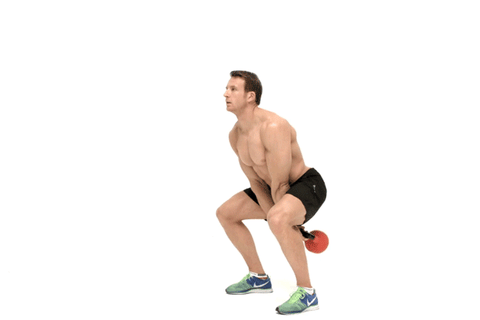
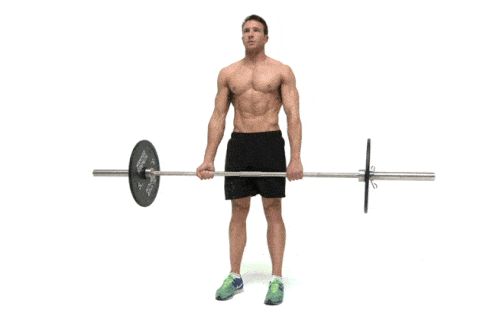
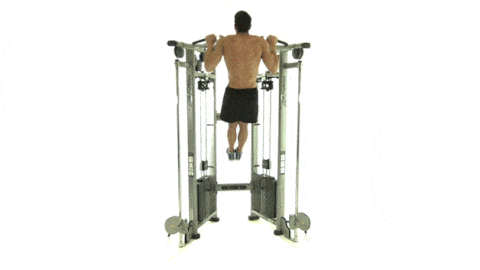

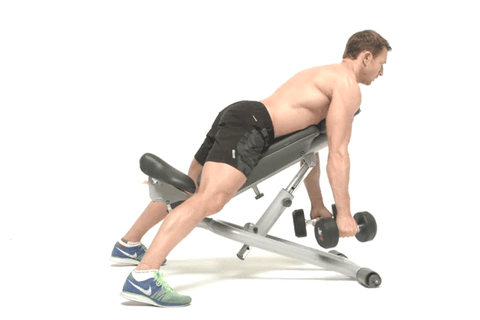
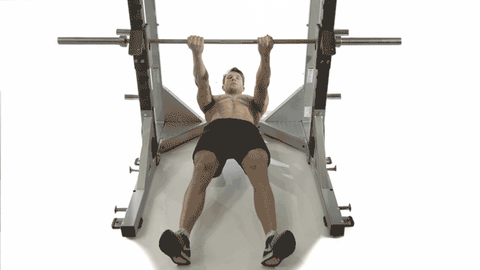

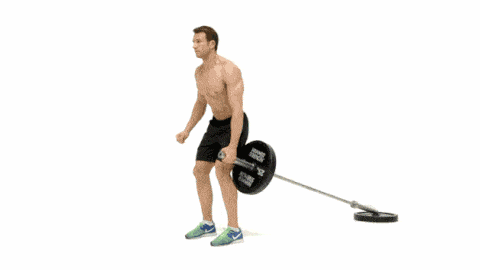

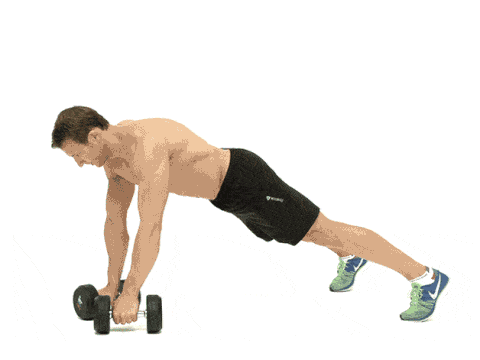
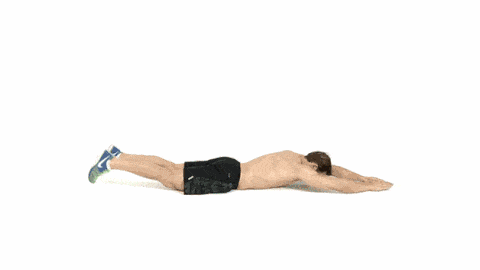
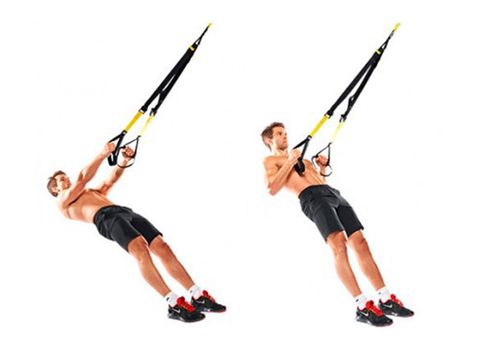


Comments
Post a Comment